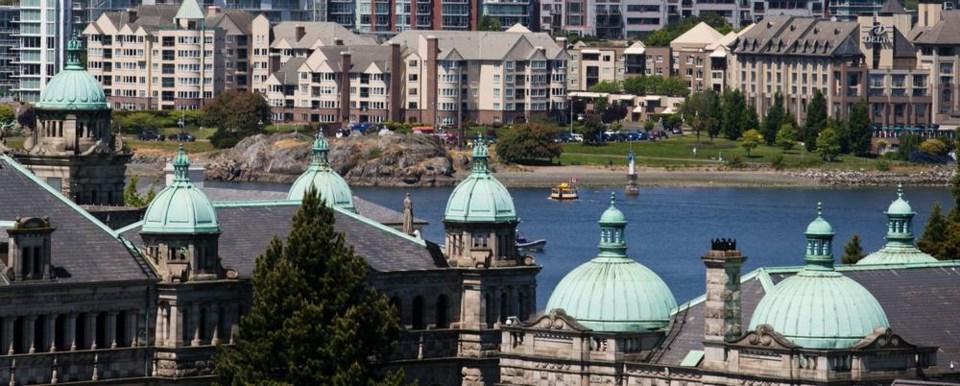One hundred and fifty years ago today, the British Colonist newspaper reported on a major event — our transition from a colony in the British Empire to a province in Canada.
A major milestone such as a sesquicentennial is reason to consider our past and think about what we would like to see in the future. A 150th birthday would normally be reason to celebrate — but in this case, we will simply mark the passage of time rather than party like they did in 1871.
British Columbia has many good points, but it is not perfect. It is still a work in progress, as it will always be, and as it was on July 20, 1871.
In a report headlined “The Birth of Liberty,” the Colonist said that at midnight, “there were manifestations of great rejoicing in the city. Bells were rung, guns fired, blue lights and Roman candles burned and crackers snapped.”
An editorial, “Confederation Complete,” noted that British Columbia formed the last link in the transcontinental chain – “the last star in the constellation which is destined hereafter to shine so brightly in the northern hemisphere.”
Flash forward 100 years, to July 20, 1971. The centennial of our province was seen as cause for celebration; the Victoria Daily Times and the Daily Colonist both published 112-page special editions to mark the occasion.
The editorials in the two newspapers could consider the creation of the province with the advantage of hindsight, with a dash of current concerns thrown in.
“If anyone seriously questioned the judgment of Sir John A. Macdonald when he opened the way to the wider union in 1871 — and there were some on the opposition benches of Parliament – they have long since been discredited,” the Colonist said.
“If there were some who maintained that the cost of a railway was too much to pay for the establishment of Canada’s frontier on the Pacific, that the colony which would become the sixth province was no more than a wilderness of mountains, and a territorial encumbrance the defences of which might involve them in a war with the United States, their voices were not remembered with any reverence.
“There were Canadians of perception who, however dimly, could discern the shape of things to come. They were sufficiently influential to overcome opposition to the union, and confident enough to offer a welcome hand to the eager colonists.
“That quality of confidence is as important to British Columbia today as it ever was, and there is vastly more in the record of accomplishment and of prospects for the future to justify it than in those years when engineers were still trying to find a rail route through the Rocky Mountains.”
Then, the newspaper sounded an alarm.
“But large as our assets are, and however stimulating the prospects, the planners of progress should balance their program with caution. Already we are experiencing the effect of inadequately controlled harvesting of the sea and forest, and there is an increasing concern over widespread pollution.”
The Daily Times said that a centenary “should also be a time for looking ahead, with a thought to avoiding the mistakes of the past and setting a new course for the future.”
The newspaper said that British Columbia did not begin in 1871, a reference to the way the province was created on the foundation built by colonists. “In that sense 1871 was a culmination as much as it was a beginning,” it said.
“We have in our centenary a base for further advancement — a foundation which today’s generation did not lay but to which it has applied the finishing touches.”
The Times said that “our real job lies ahead,” a statement that is as true in 2021 as it was in 1971. A work in progress, it will never be finished.
Much remains to be done. Many voices have been ignored over the years, and it is imperative that we become more inclusive and commit to moving forward together.
It could be said that British Columbia has been built through the exploitation of resources, both natural and human. We need, more than ever before, to respect the land, the sea, and the people — all the people.
Today, however, could be a day to reflect in what Confederation means to British Columbia. In 1871, from a purely transactional perspective, it meant the colony’s debts would be paid off and a railway would be built. Today you could sub in money for infrastructure projects, or the vaccines Ottawa acquired to fight COVID-19.
Frankly, though, that’s no way to measure the value of our place within Canada. To reduce it to a business relationship, a ledger of pluses and minuses, is to ignore what really matters, the elements we have in common, the ones that hold us together by outweighing those that keep us apart.
A common sentiment lately has been to attack and tear down our country, our province and our institutions. We are — finally, thankfully, painfully — beginning to come to grips with the ugly parts of our past, but that shouldn’t preclude us from also recognizing the good and beautiful.
A final note from the 1971 Times editorial that seems even more appropriate today:
“To condemn the province is merely to condemn ourselves.”
dobee@timescolonist
Dave Obee is editor and publisher of the Times Colonist
- - -
To comment on this article, send a letter to the editor: [email protected]



